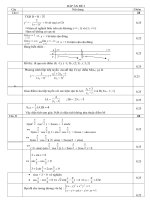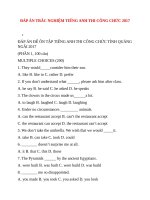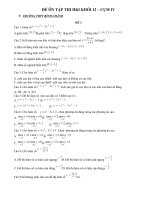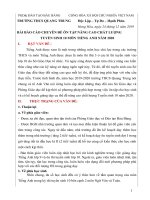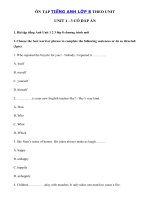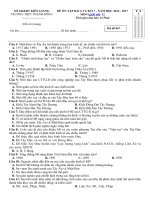Ltv đáp án đề ôn tập ts 10 năm 2022 2023
Bạn đang xem bản rút gọn của tài liệu. Xem và tải ngay bản đầy đủ của tài liệu tại đây (97.39 KB, 2 trang )
TRƯỜNG THCS LƯƠNG THẾ VINH (UNIT 4)
ĐÁP ÁN ĐỀ ÔN TẬP TUYỂN SINH 10- 2022-2023
I. Choose the word or phrase (A,B,C or D) that best fits the blank space in each sentence: (3.5ms)
1. Find the word whose underlined part differs from the other three in pronunciation
A. reputation /teɪ/
B. campus /æ/
C. candidate/æ/
D. examination /æ/
2. Find the word whose underlined part differs from the other three in pronunciation
A.examiner /ɪ/
B. aspect /e/
C.experience/ɪ/
D.scenery /ɪ/
3. Find the word that differs from the other three in the position of primary stress
A.finish /ˈfɪn.ɪʃ/
B.examiner /ɪɡˈzæm.ɪ.nər/ C.difficult /ˈdɪf.ɪ.kəlt/D. language /ˈlæŋ.ɡwɪdʒ/
4. Find the word that differs from the other three in the position of primary stress
A. aspect /ˈæs.pekt/
B. passage /ˈpæs.ɪdʒ/ C. terrible /ˈter.ə.bəl/ D. dormitory /ˈdɔː.mɪ.tər.i/
5. What ____ of learning English do you find the most interesting?
A. sides
B. fields
C. aspects
D. angles
6. Our school has many well -_____ teachers.
A. qualified
B. qualify
C. quality
D. qualification
7. I saw your school’s _____ in today’s edition of the Viet Nam News.
A. advertiser
B. advertisement
C. advertising
D. advertise
8. We usually use an English-Vietnamese dictionary _____ reading.
A. to
B. of
C. for
D. in
9. She asked him what ________.
A. his name is?
B. his name is.
C. his name was?
D. his name was.
10. Mr. Brown asked me if ___________ speak English.
A. I could
B. I can
C. you could
D. you can
11. I hope I can read newspapers ___________English after the course.
A.on
B.in
C.by
D.with
12. “Peter, don’t walk on the grass or pick the flowers, please”
- “_______________”
A. Thank you.
B. Sure. I won’t.
C. Well done.
D. That’s a good idea.
13. “I have passed the final exam with excellent scores.”
– “_______________”
A. Well done!
B. Best wishes!
C. It’s my pleasure. D. That’s a good idea.
14. She asked me _____ I came from.
A. where
B. what
C. who
D. which
II. Look at the sign/picture. Choose the best answer (A,B,C, or D) for each sign/picture (0,5m)
15. What does this sign mean?
A. No running
B. No dancing
C. No skateboard/ roller skate
D. Sport center.
16. What does this sign mean?
A. Slippery road
B. Narrow road.
C. No touching.
D. Danger. Accidents can happen
III. Use the correct form of the word given in each sentence. (1,5ms)
17. We often take part in many....cultural...........activities at school. (culture)
18. If you want to ....improve.................. your English, we can help you. (improvement)
19. He is an .........editor................ of this newspaper. (edition)
20. This book is not ....available............(avail)
21. He.....exactly........... answered these questions . (exact)
22. English spelling presents special ..difficulties......................... for foreign learners. (difficult)
IV. Rearranging the words or phrases to make a complete sentence. (0,5 m)
23. The examiner / asked/ where / from / she came/Lan .
→The examiner asked Lan where she came from.
24. because we can’t / speaking English / I disagree / with native speakers /practice /. / _
→ I disagree because we can’t practice speaking English with native speakers _____________
V. Reading comprehension (1,5ms)
Have you ever noticed advertisements which say “Learn a foreign language in 6 weeks, or your money back.
From the first day your pronunciation will be excellent. Just send…” and so on? Of course, it never happens
quite like that. One’s mother language is easier to learn, but it also requires a lot of practice to be fluent. And
think how much practice that gets! Before the Second World War, people usually learned a foreign language in
order to read the literature of the country.
Now speaking a foreign language is what most people want. Every year millions of people start learning one.
How they do it? Some people try it at home, with books and records of tapes; some use radio or television
programs; some use computers and network; others go to evening classes. If they use the language only 2 or 3
times a week, it will take a long time, like learning a foreign language at school. A few people try to learn the
language fast by studying for 6 or more hours a day. It is clearly easier to learn the language in the country
where it is spoken. However, most people cannot afford this, and for many it is not necessary. They need the
language in order to do their work better. For example, scientists and doctors chiefly need to be able to read
books and reports in the foreign language. Whether the language is learned quickly or slowly, it is hard work.
Machines and good books will help, but they cannot do the students’ work for him.
A. Choose true or false:
25. According to the advertisements, you needn’t pay your money if you can’t learn a foreign language in 6
weeks. true
26. Learning a foreign language is easier than learning one’s mother language. false
27. The best way to learn a foreign language is to go to the country where the language is spoken. true
28. Machines and good books are useless for us to learn a foreign language. false
B. Choose the most suitable item.
29. What does the word” It” in line 7 mean?
A. literature of the country
B. learning a foreign language.
C. television program.
D. computer and network.
30. What is the main idea of this passage?
A. Advertisements about learning a foreign language in 6 weeks.
B. It is not compulsory to learn a foreign language.
C. The ways to learn a foreign language.
D. Learning a foreign language 2 or 3 times a week.
VI. Choose the word (A, B, C or D) that best fits the blank space in the following passage. (1,5m)
It might sound strange to you but these are some important rules. If you want to pass examinations, then study
grammar. (31)_______, if you want to become fluent in English, try to learn English without studying too
much grammar (32) _______ that will only slow you down and confuse you. You will think about the rules
when creating sentences instead of speaking naturally like a native speaker. Some native speakers do not
know so many grammar rules as non-native students do.
Everyone can (33)_______ at least one language whether they are intelligent, or lack some brain power. This
could be achieved (34)______ being surrounded by that language at all time. You may notice that there are
also some people who study abroad and learn very little. That is because they go to an English speaking
school, but find friends from their own country and don’t practice English. Others can speak English well
because they live in an English speaking (35)_________.
Therefore, why don’t you surround yourself with English? Make rules with some friends that you will only
speak English when meeting up for a coffee, for example. You can also carry around an iPod and listen to
English as (36)___________ as possible.
31. A. Then
B. However
C. But
D. Therefore
32. A. because
B. but
C. so
D. although
33. A. tell
B. talk
C. say
D. speak
34. A. for
B. of
C. by
D. with
35. A. school
B. environment
C. place
D. area
36. A. many
B. lot of
C. much
D. Little
VII. Transformation (1m)
37. Walk faster or you will miss the bus.
→If you walk faster, you won’t miss the bus./ If you don’t walk fast, you will miss the bus.
38. “I will go to Hue tomorrow’ Mr. Chi said to Lan.
→Mr. Chi told Lan that he would go to Hue the next day.
39. ”Can you use a computer at your school?”He asked me
→He asked me if/whether I could use a computer at my school.
40. Tom passed the final exam easily.
→ Tom had no difficulty (in) passing the final exam
.



